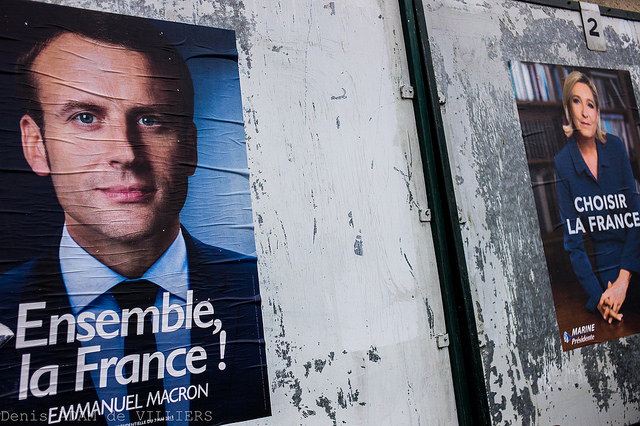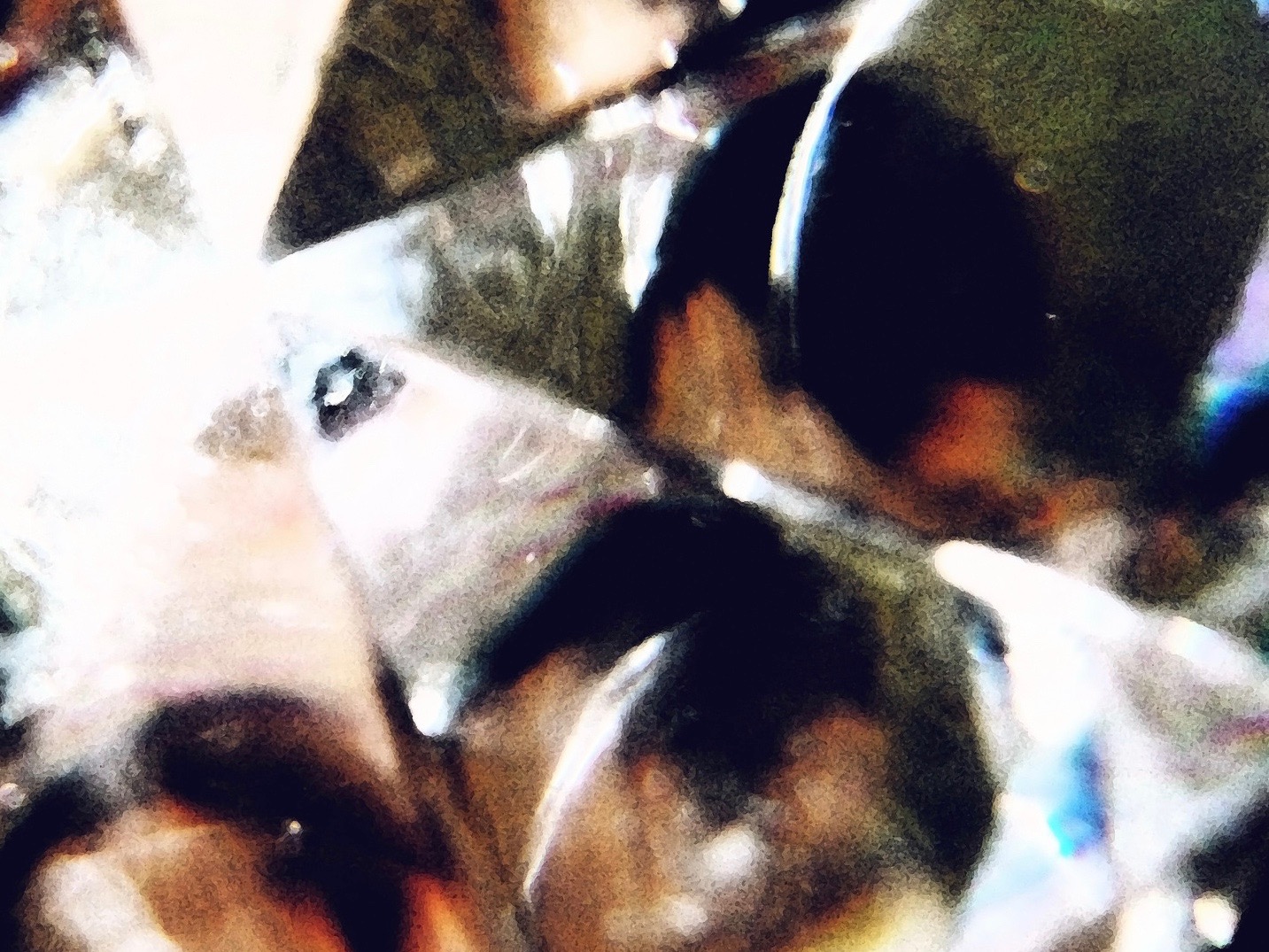
Do Not Remember What You Do Not Want To
The predictable result arrived: Emmanuel Macron is the new French president.
Macron was granted several gifts during this election campaign: the conservative candidate François Fillon’s corruption scandal and subsequent evisceration as well as Benoît Hamon’s being jettisoned by his own party, for starters. There was also a general animosity towards existing parties, and the popular ultimatum of the second round, “vote Macron, or you love fascism”
In all fairness, Macron had a good run: he managed to build a strong electoral base out of tenuous ideological leanings and succeeded in keeping it engaged for the entire election, despite not giving his supporters much to defend other than vague buzzwords–similar to Theresa May’s love for ‘strength and stability’. Macron is, for all intents and purposes, the embodiment of a (somewhat crass) desire for power and infallibility, smiling down at us with Hollywood-white teeth.
Of course, to become an acceptable candidate for the left-wing electorate, the facts of Macron’s campaign needed to be rewritten, in a form of fiction that would make him an acceptable candidate to vote for. He was declared to be the voice of solidarity, compassion, and unity. These qualities seemed to be lacking in Macron’s law for workplace regulation, support of the El Khomri law or time in government, and he gave no indication of change during his run. But Macron is a business mogul, has good teeth, and lived as a student, with 1000 euros a month–a situation he labeled as ‘precarious’. This fiction, that Macron was one of us but also a healthy aspiration, worked: the question is, why did these people believe it? What motivates political faith?
The answers to these questions were handed to me not when Macron got elected, but four days before the results on the third of May, at a screening of the Macron-Le Pen debate hosted by the Macron camp. The viewing took place in an elegant brick-walled locale in the first arrondissement. There were steep stairs and too many people, and an endless circulation of waiters and cameras. News crews interviewed me and asked if I believed Macron was doing well. Responding to the atmosphere of self-congratulation, I said he was: I did believe that Macron was doing his best to avoid engaging with Marine Le Pen’s many baffling streams of consciousness.
As the night went on, speaking to the people around me I had the same feeling I did when I met die-hard Benoît Hamon supporters back in the primaries: the distinct impression that they exist on a different emotional plane, not in any way better or worse, but strictly parallel; our different languages untranslatable. I kept walking in and out of the venue for some relief from the ambient rumble. At one point, I started talking to a boy with sharp cheekbones and a thin scarf, an active participant in the Macron campaign. I told him about my fears of Macron’s project to fuse and privatize universities. He said he could not answer my concerns at that exact moment, but was sure he could were he prepared. It seemed strange to me that one would support a candidate to the point of becoming a staffer yet be unable to debate an area as fundamental as education, but I am sure I could find people with similar attitudes in every political camp. I then mentioned my biggest concern with Macron: his values, and more specifically, his unfettered belief that Reagan-esque greed is good doctrine. In 2015, Macron told Les Echos that every young French person should want to become a billionaire, and in 2017, he expressed desire to transform France into a country where anybody could create a start-up. The young man replied that Macron obviously thought there were other ways to succeed, that I had failed to recognise the subtext. It seemed that if his favoured candidate said something displeasing, he thought it logical to inject imaginary subtext so that it could become appealing.
As we talked, on a street where cameramen asked for lighters we’d toss them with a distracted flick of the wrist, the core difference became clear: Macron’s electorate benefits from unbridled optimism. I deal in sinking, sometimes eccentric, pessimism. They saw potential; I saw the ways it would be weaponized. They saw a virtuous man; I saw an agenda. When asked the question who benefits, we clearly had different answers. On the subject of university privatisation, they saw universities competing in a global world while I saw universities selling us to the highest bidder, letting corporate interests dictate our research. There is a precedent to such a procedure: there were, in 2014, five thousand Koch scholars in America–students funded by Koch industry. According to Greenpeace, Koch industry has given over 100 hundred million dollars since 1997 to 84 climate change denying groups.
The Macron camp saw a revived European project; I saw a plan to crush Eastern European countries who actively spoke out against Macron’s economic agenda, such as Beate Szidlo in Poland. Nobody bought into this fiction more than the British, who believed in him to the point of a certain sad desperation, baited by the very prospect of the word ‘Europe’.
Financial deregulation was, to Macron enthusiasts, a way to boost the country’s economy, though I saw nothing more than a guarantee that corporations would be able to bankroll their stockholders with less obstacles. They saw opportunity, I saw the worst aspects Reagan had encouraged in the American psyche. They saw the removal of the property tax as the removal of an unfair burden. I, once more, turned to history and California, where such measures were once taken. In five years, education had plummeted to the bottom of the barrel, having previously been the best in the union. The Macron camp seemed, therefore, ready to gamble away the potential loss of some of France’s best social assets: extensive workforce protection, free and independent research, and a strong welfare state funded by taxpayers.
I remembered what Margaret Atwood said in a recent interview for Reuters, “people have forgotten that civil rights themselves had to be hard fought for and have to be fought to maintain because someone is going to take them away from you if they get the chance.” The Macron camp would lambast me for this quote. After all, aren’t they the ones who opposed the infinitely practical Le Pen boogeyman? Have they not defeated, single-handedly of course, the fight against abortion or racism? Was I not told by a Macron voter that if she were to fall pregnant, it would be absolutely normal for a company to fire her? It seems as if for many, class and workforce protection have become such trivial concepts that we have forgotten to fight for them. Glib identity politics for edgy liberals do not seem to encapsulate them. I may be wrong, and I am sure there is evidence to support both sides of this argument, but rights have changed and will change.
The boy with the thin scarf and I had gone back inside to keep an eye on the debate. As we spoke, my arguments went back to Reagan, to the way his ethics translated into policy, and how his legacy swung the American Rust Belt into Trump’s hands. Cities like Detroit, I explained, had been depleted of their resources, jobs, infrastructures. He told me he thought Detroit was doing better.
I remembered speaking to Bill McGraw, a Michigan-based journalist, some months ago. He told me about the crackdown on drug crime and mass incarceration in Detroit; how 650g of crack got you life without parole, how racial profiling and police brutality were still an active issue. He also told me about the way, every ten years, people would speak of Detroit being born again, mostly due to investments clustering in the city center. He said there was truth to it, but the funding mostly went to white people, and the political and judicial situation was bound to worsen with the appointment of hyper-conservative Attorney General Jeff Sessions. Seminal Detroit academic Thomas Sugrue, when asked if Detroit was indeed ‘back’, gave me some enlightening figures. The ‘new’ Detroit that was covered in the media was representative of about 19 square kilometers–about five percent of Detroit’s total size. The boy said “that’s funny, I really thought they were doing better.”
The attitude towards Detroit then was the same as the Macron view of the future. If life was better for a slice of society, and that slice was privileged (and therefore powerful) enough, then it was enough to paint the whole picture with a gloss of plastic optimism. Turn two blind eyes, and don’t remember if you don’t have to. Rich white men with good teeth and cuffed shirts can do no wrong, that much is sure.
The conversation with the boy with the thin scarf ended when he was asked his thoughts on the debate by a journalist. It seemed strange to me that a man who seemed to have spent a good deal of time not watching the debate but smoking outside with a sullen leftist boy, could answer her questions with such confidence, as if he were delivering a rehearsed speech. But this was the Macron camp, and different rules applied.
Photo credit: flickr







